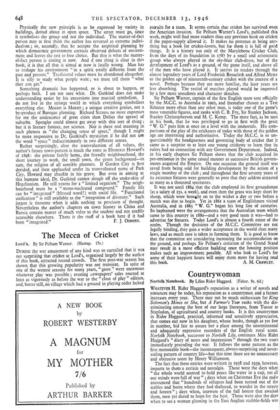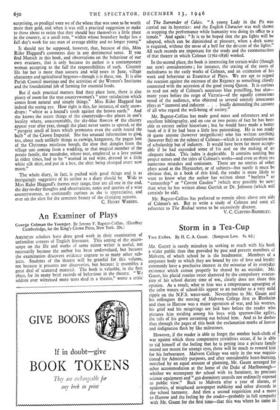Countrywoman
Norfolk Notebook. By Lilies Rider Haggard. (Faber. 8s. 6d.)
WHATEVER H. Rider Haggard's reputation as a writer of novels and romances may be today, his reputation as a countryman and a farmer increases every year. There may not be much enthusiasm for King Solomon's Mines or She, but A Farmer's Year ranks with the dis- criminating among the best of our large literature, from Tusser to Stapledon, of agricultural and country books. It is this countryman in Rider Haggard, practical, informed and sensitively appreciative, that comes out now in his daughter, whose books, though as yet few in number, bid fair to assure her a place among the unsentimental and adequately expressive recorders of the English rural scene. Norfolk Notebook, successor to Norfolk Life, continues Miss Rider Haggard's " diary of notes and impressions " through the two years immediately preceding the war. It follows the same pattern as the first memorable book—the inconsequent, always-surprising and never- staling pattern of country life—but this time there are no unnecessary and obtrusive notes by Henry Williamson.
The fact that these entries were written in 1938 and 1939, however, imparts to them a certain sad nostalgia. Those were the days when " the whole world seemed to hold peace like water in a cup, yet all our minds were full of war" ; days when on Christmas Eve the radio announced that "hundreds of refugees had been turned out of the stables and barns where they had sheltered, to wander in the streets and forests " ; days when, unaware of the full horror that awaited them, men yet dared to hope for the best. Those were also the days when to see a woman gleaning in the East Anglian stubble-fields was
surprising, so prodigal were we of the wheat that was soon to be worth more than gold, and when it was still a practical suggestion to make to those about to retire that they should buy themselves a little place in the country, at a small rent, " within whose boundary hedge lies a full day's work for any man of average ability and no longer young."
It should not be supposed, however, that, because of this, Miss Rider Haggard's comments date in any detrimental sense. If you find Munich in this book, and observations on the behaviour of our own evacuees, that is only because its author is a contemporary woman accepting to the full the responsibilities of such. Country life for her is more than sunsets and wild roses in June, village characters and agricultural bygones—though it is these, too. It is also Parish Council meetings and the activities of the Women's Institutes and the foundational job of farming for essential foods.
But if such practical matters find their place here, there is also plenty of room for the true countrywoman's " utter satisfaction which comes from natural and simple things." Miss Rider Haggard has indeed the seeing eye. How right is this, for instance, of early snow- drops: " white as a hound's tooth against the brown earth." And she knows the secret things of the countryside—the places in one's locality where, unaccountably, the sky-blue flowers of the chicory appear year after year, though the plant never seems to spread, or the " pungent smell of foxes which permeates even the earth round the bulb" of the Crown Imperial. She has unusual information to too, about such unlikely things as earwigs, kangaroos, the pagan lore of the Christmas mistletoe bough, the shoe that dangles from the village taxi coming from a wedding, or that magical member of the potato family, the mandrake, whose root, employed as a love potion in olden times,had to be "washed in red wine, dressed in a little white silk shirt, and put in a box, the shirt being changed every new moon."
The whole diary, in fact, is packed with good things and is as intriguingly suggestive of its author as a diary should be. Wide as Miss Rider Haggard's themes may range, they are all one in the end, the day-to-day thoughts and observations, notes and queries of a wise countrywoman, as continually curious as she is appreciative, and ever on the alert for the common beauty of the changing seasons.
C. HENRY WARREN.



































 Previous page
Previous page